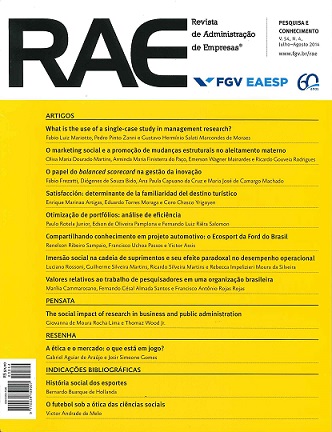The role of the BSC in managing innovation
Main Article Content
Abstract
This paper aims to study how the Balanced Scorecard is related to the process of innovation in organizations. As a contribution, the work expands the usefulness of the model, BY specifying external stimuli, dynamic tension, innovation strategies and perceived innovation success. This is a descriptive study developed from a sample of 121 companies by means of a questionnaire survey. The data analysis was done with use of structural equation modelling. The findings suggest a complex long-term process, vital for companies that have their perception of success influenced by elements from outside the organization (external stimuli) and internal stimuli (dynamic voltage and innovation strategies). Innovation management becomes reckless in the absence of mechanisms that balance the tensions evidenced by indicators including conflicting temporal dimension in the long term, and the risk is greater when the perception of success is captured solely by short-term financial indicators.
Downloads
Download data is not yet available.
Metrics
Metrics Loading ...
Article Details
How to Cite
FREZATTI, F.; BIDO, D. de S.; CRUZ, A. P. C. da; MACHADO, M. J. de C. The role of the BSC in managing innovation. RAE - Revista de Administracao de Empresas , [S. l.], v. 54, n. 4, p. 381–392, 2014. Disponível em: https://periodicos.fgv.br/rae/article/view/28865. Acesso em: 13 may. 2024.
Section
Articles
A RAE compromete-se a contribuir com a proteção dos direitos intelectuais do autor. Nesse sentido:
- adota a licença Creative Commoms BY (CC-BY) em todos os textos que publica, exceto quando houver indicação de específicos detentores dos direitos autorais e patrimoniais;
- adota software de detecção de similaridades;
- adota ações de combate ao plagio e má conduta ética, alinhada às diretrizes do Committee on Publication Ethics (COPE)



